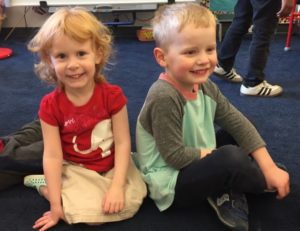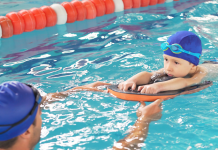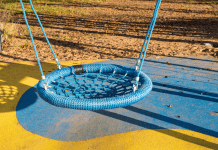I sat on my bed for the usual nightly routine of reading books. I used to read to the kids and now they read to me. I still help my daughter along as she’s just recently turned 6. But on this particular night, my son decided to assist his sister, and as I listened to her stumble through the words, I noticed it seemed to be going better than when I help her.
This isn’t surprising, and maybe you’ve observed a similar phenomenon. Backed by research, children often achieve more in a variety of areas (communication, reading, using utensils, sitting and listening) when a peer is modeling something they’ve previously learned from an adult.
My kids and I were fortunate that they spent their early education years as peer models in a therapeutic preschool. The choice was an easy one for me, as I happened to work at said preschool … but for those in the KC community not yet familiar, allow me to explain!
A peer model program places typically developing children alongside same-aged children with special needs within the classroom setting. These children may receive special classroom instruction and integrated therapies. In our case at Ability KC, the ratio of children with special needs to typically developed children was opposite from school settings not implementing a peer model, also called “reverse inclusive.”
According to kidstogether.org, this model greatly benefits both students with disabilities and students without disabilities. Such benefits include enhanced friendships, stronger academic outcomes, and acceptance of others, just to name a few.
But beyond a list of pros for the program, I wanted to change the world. This might sound like a lot, but I remember an unfortunate number of stories around this time of police brutality toward adults with autism.
Many of us adults remember our upbringing in school when we were completely segregated from peers who had an array of challenges. This classroom setting made both sets of children grow into adults who were unaware and intimidated of the unknown. Until I was an adult working in an agency specializing in therapeutic and rehabilitation services, I likely would have approached people with physical disabilities differently, and not even have had the awareness of all the underlying disabilities people are dealing with that are not visible whatsoever.
I wanted my kids to see: just because someone doesn’t look like you, think like you, or process things like you, it doesn’t mean one way is right, or one way is more appropriate. We are all different, and all in this together.
The result was better than I could have expected. Not only did my children receive the instruction to be kindergarten-ready, but they were kind, patient, understanding, and empathetic leaders. I couldn’t have taught these soft lessons to my children in a vacuum in our home, or in many other preschools who do not have industry-leading accreditation and proven data outperforming other early education centers.
I also witnessed my children receiving the same care and attention as kids who needed help to get around or had feeding tubes. It is realistic for parents to worry their child who doesn’t need medical or special education could be looked over. However, that was not the case at all at Ability KC. I was continually updated on my children’s progress and their areas of concern with parent/teacher conferences, emails, and in-person updates. In fact, I dropped my daughter off for class one day and her teacher pulled me aside. “Have you noticed Adria is missing quite a lot of her blends and is difficult to understand?”
Suddenly a montage of memories flashed before me of other adults looking to me quizzically while I translated for my daughter. I realized since I always understood her, I hadn’t properly identified an issue we were having. My “typical” child was soon diagnosed with a speech developmental delay and sessions with a speech language pathologist became part of her regular preschool routine. And may I underscore what a relief it is to ANY parent for their child not to have to go to different locations to receive needed services during their workday.
I could go on and on about how this platform was the best choice I could have made for my children’s preschool experience. I’m so pleased with what they know now as elementary students, and more importantly who they ARE. As our city and others create greater inclusion, we’re working for a future where there’s no “normal.” There will always be bullies, there will always be bad cops … but I truly believe there will be way less of both, because of what we now realize. When we come together and live side-by-side with friends of varying abilities, the world works better.
I’m doubly pleased to let our readers know that built on a foundation of success of serving thousands of families, Ability KC’s therapeutic preschool is expanding to serve even more families in the Kansas City area than ever before. Now is the perfect time for both kids with disabilities and peer mentors to apply for admission; more information can be found here.
















